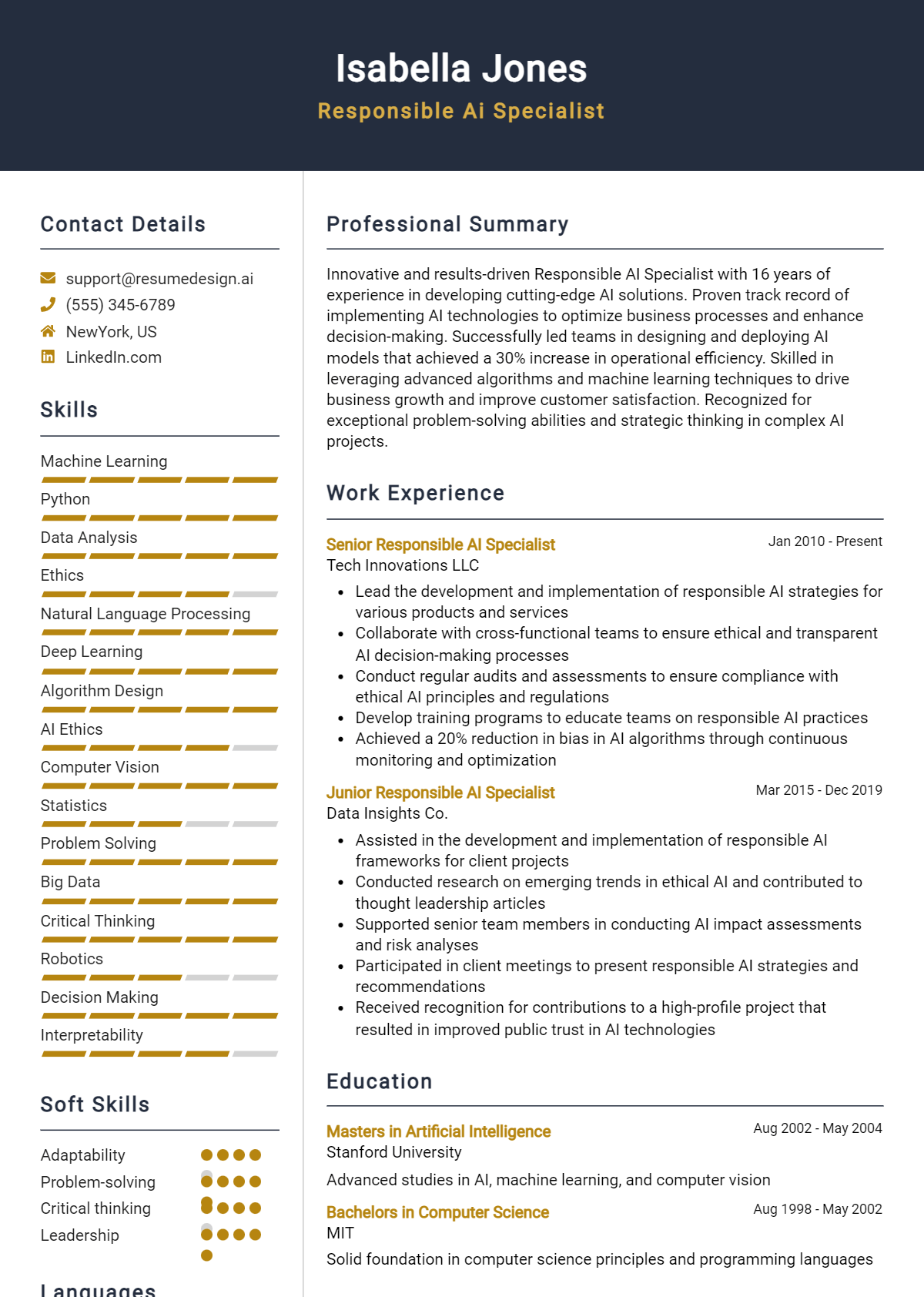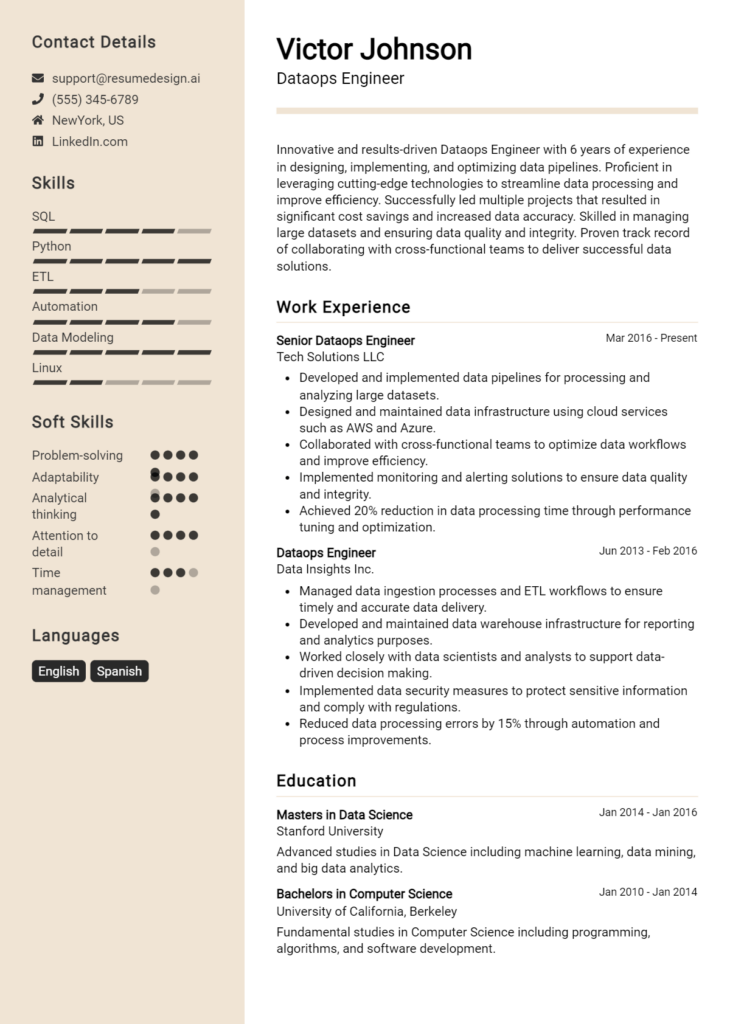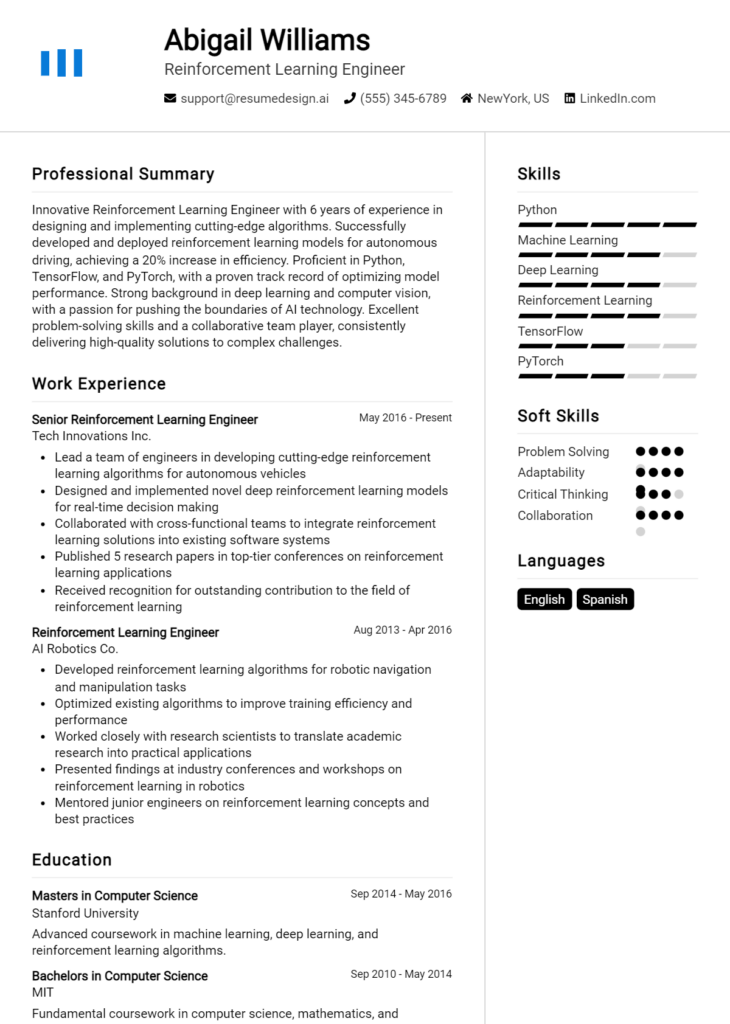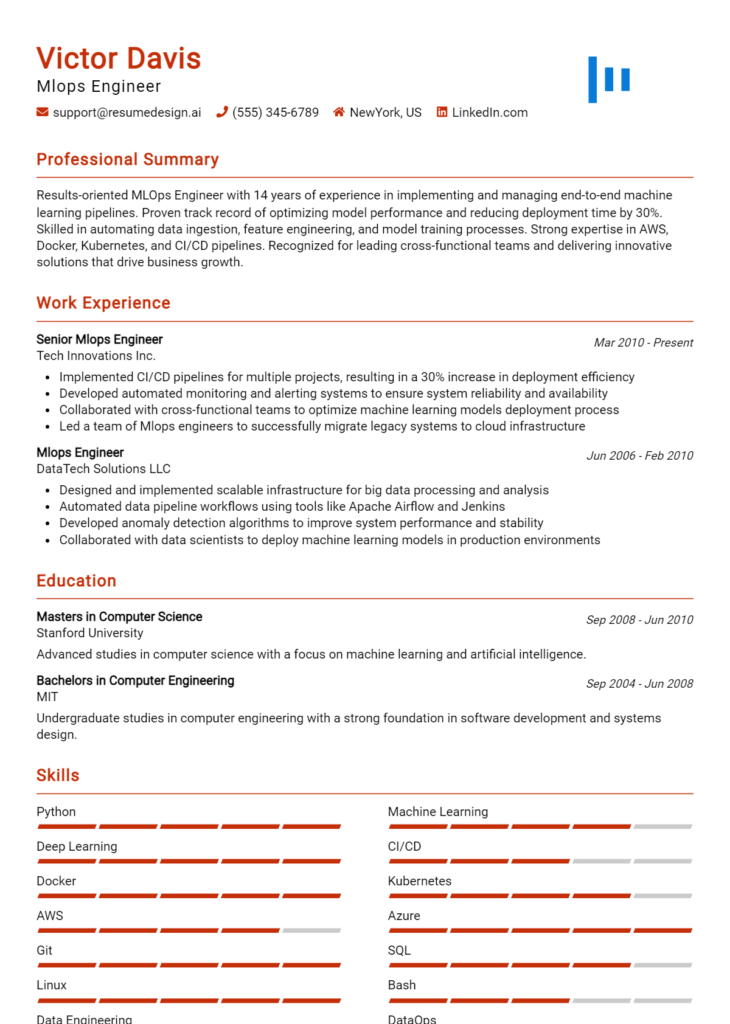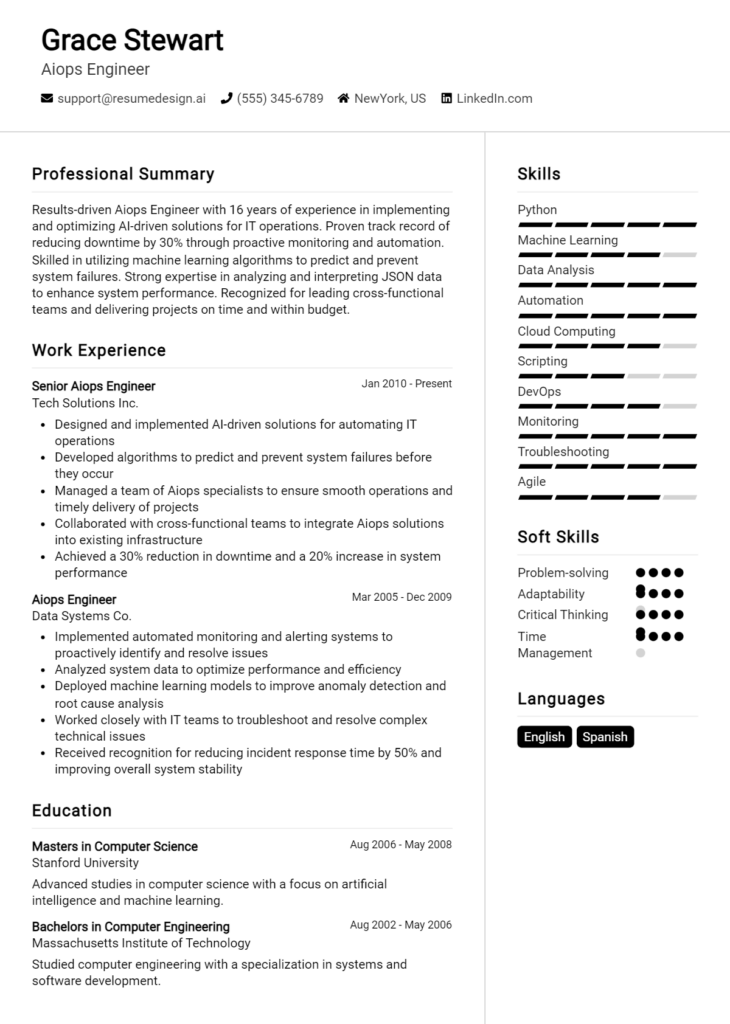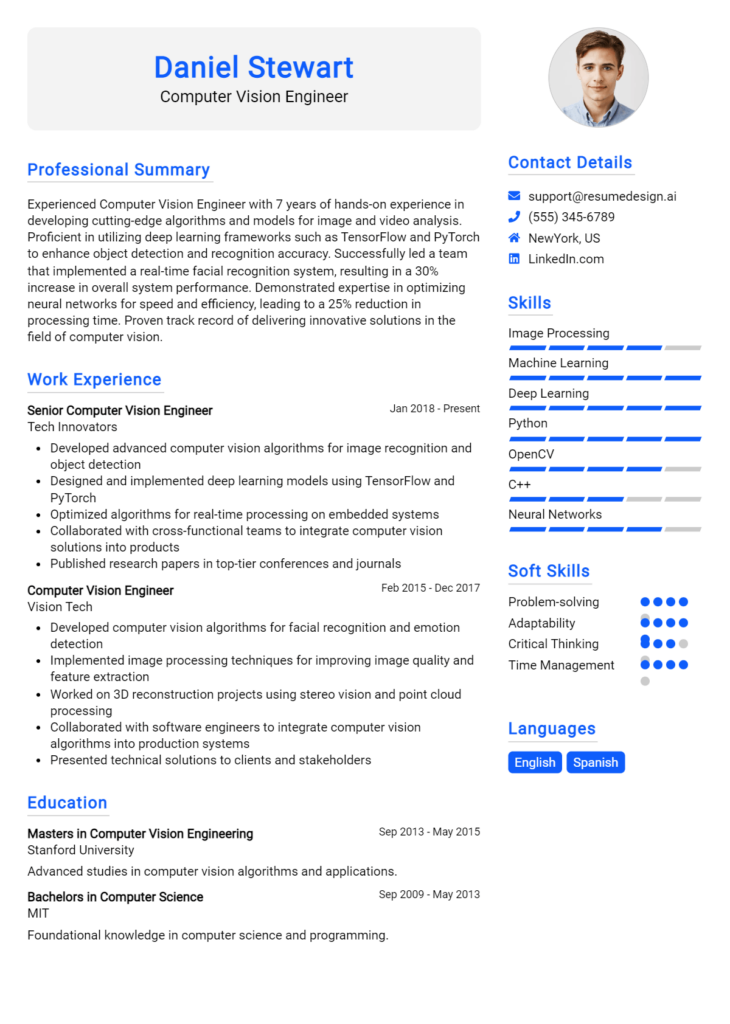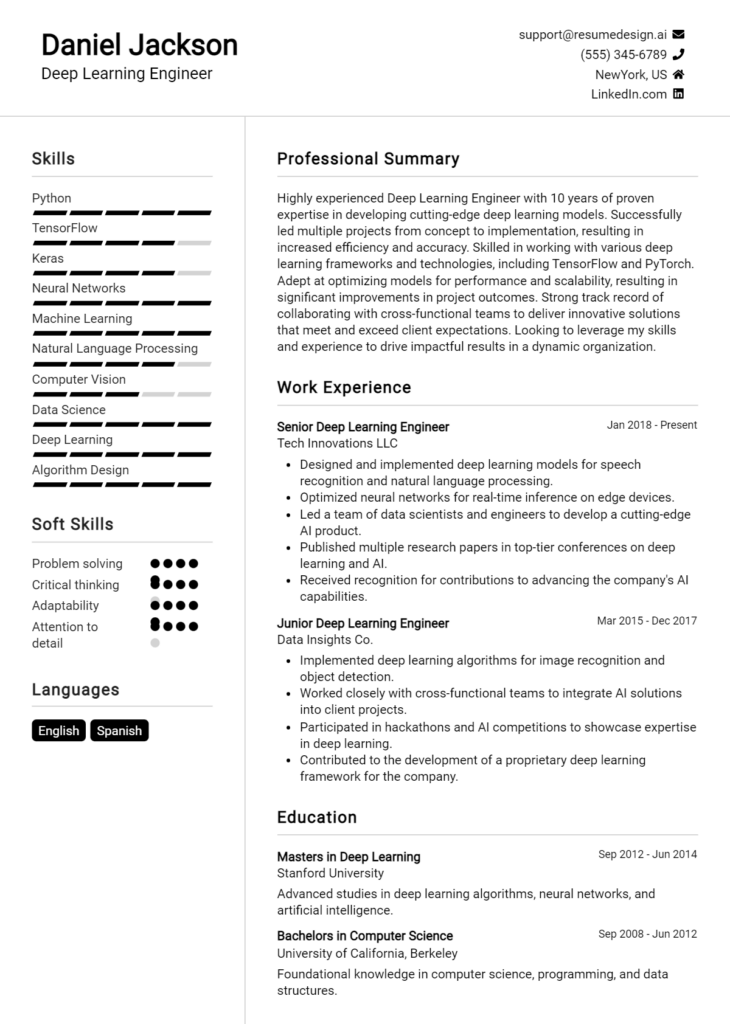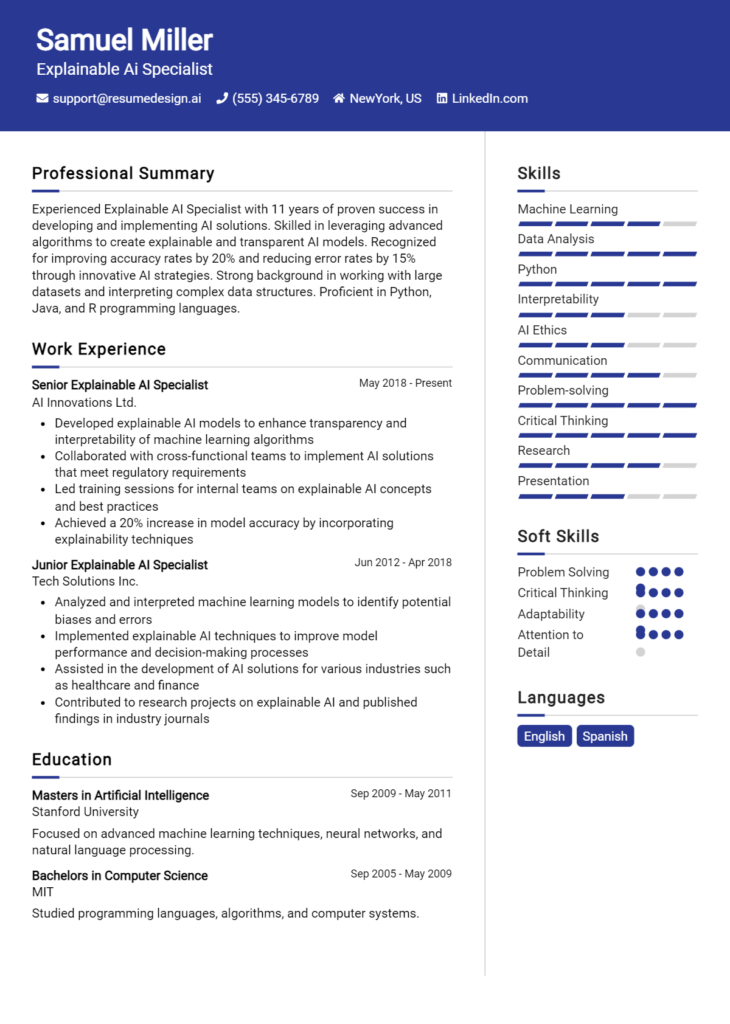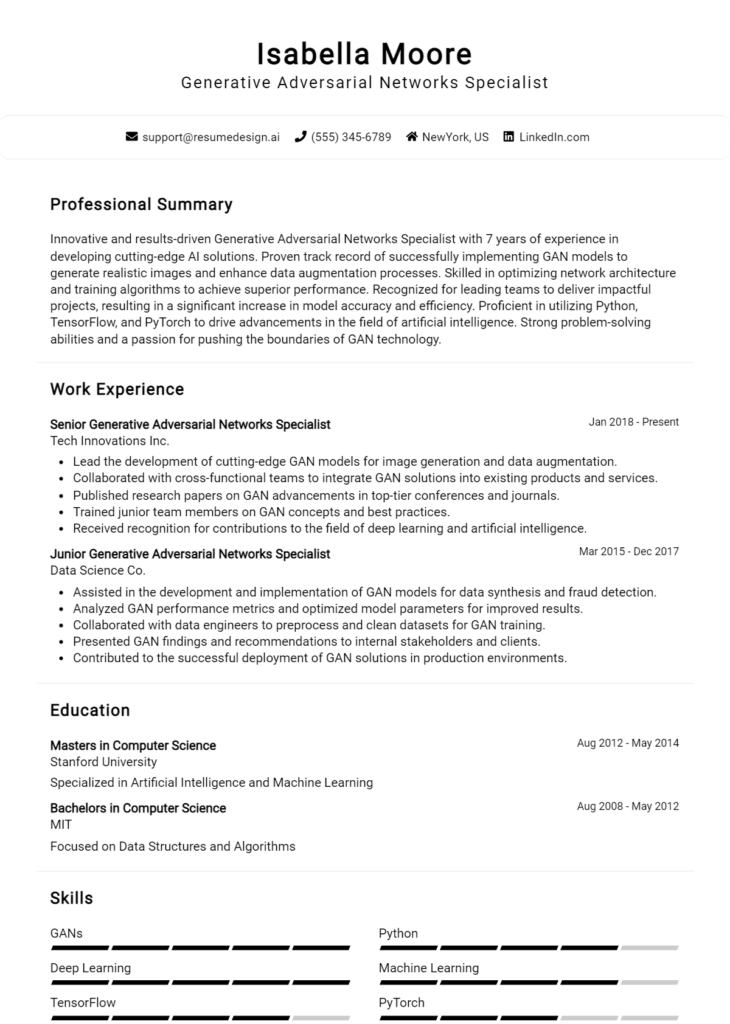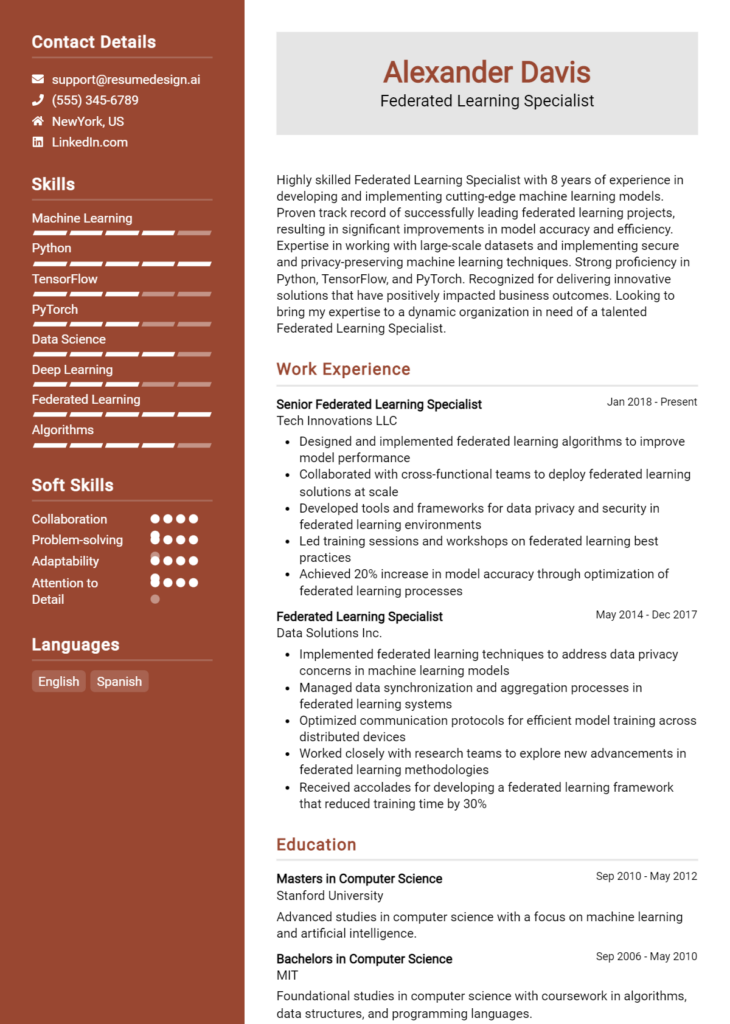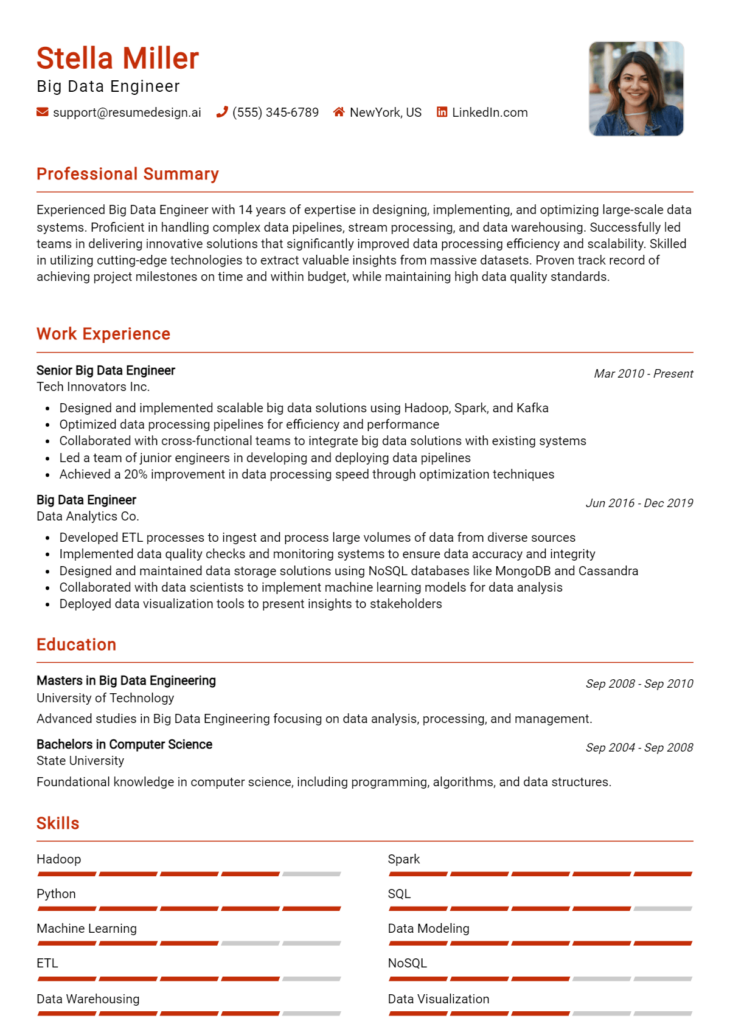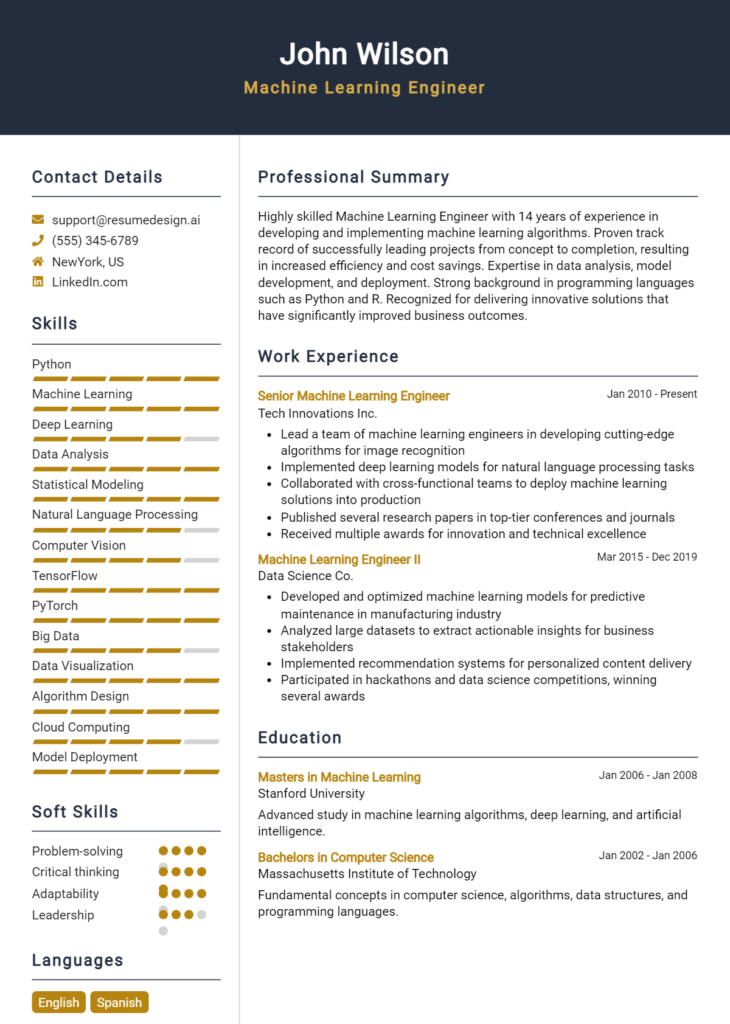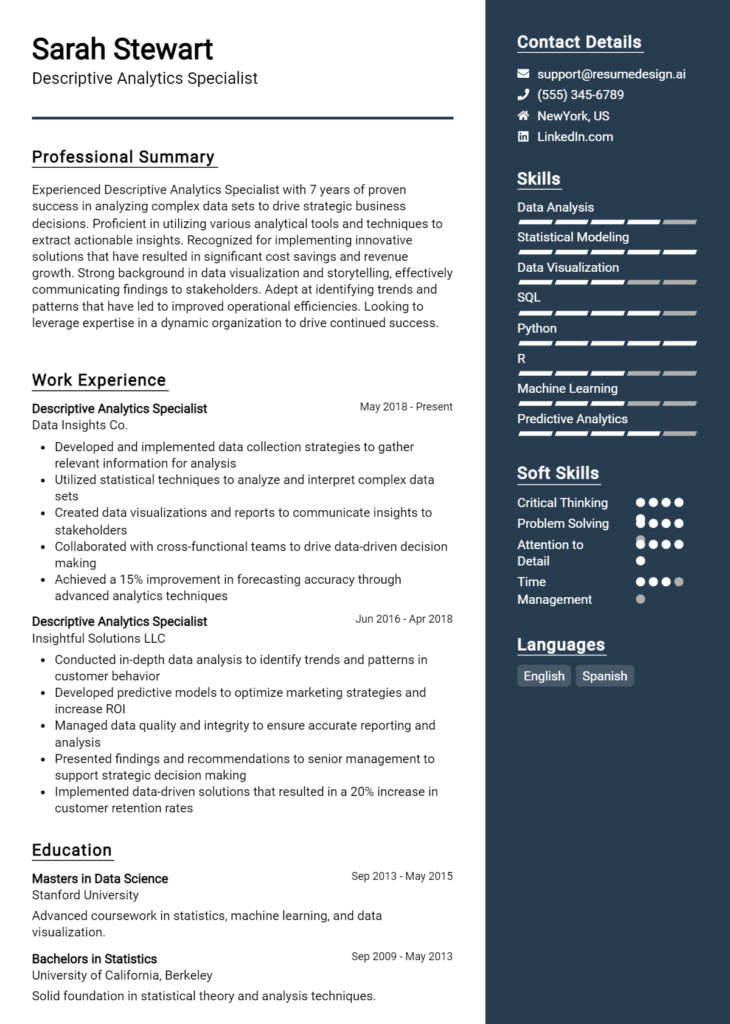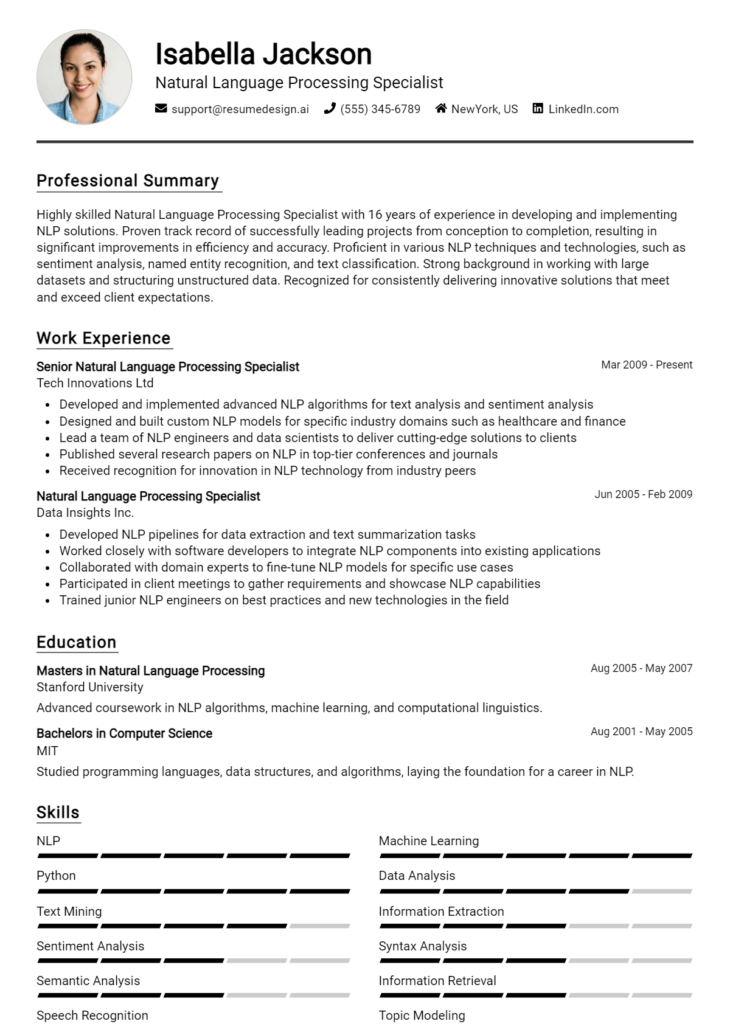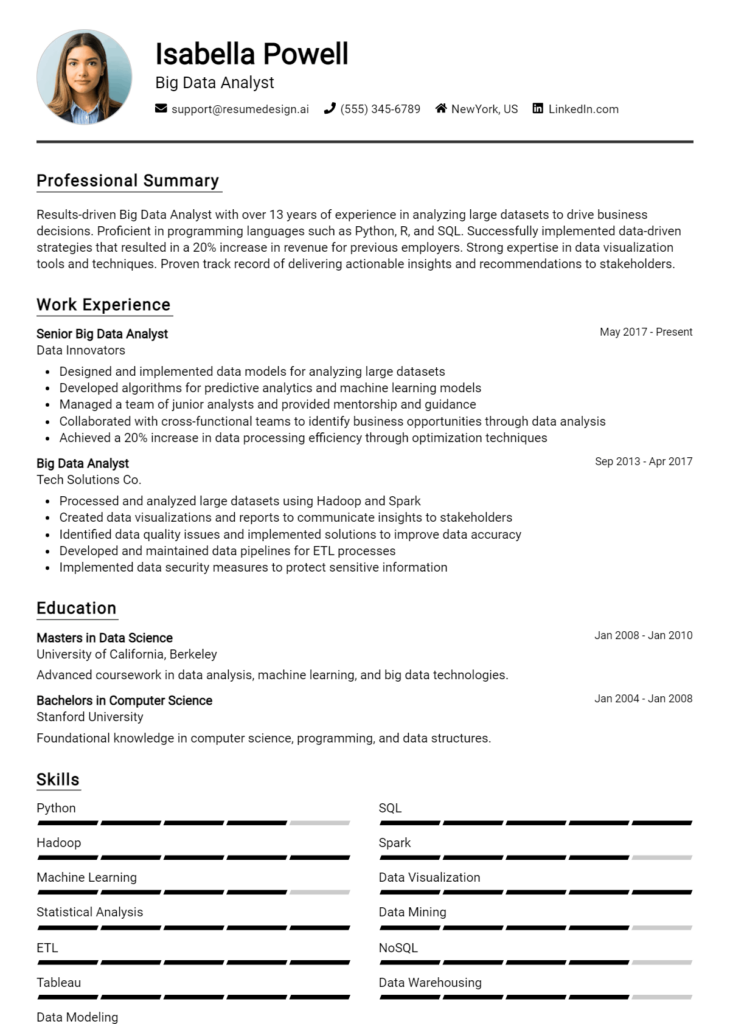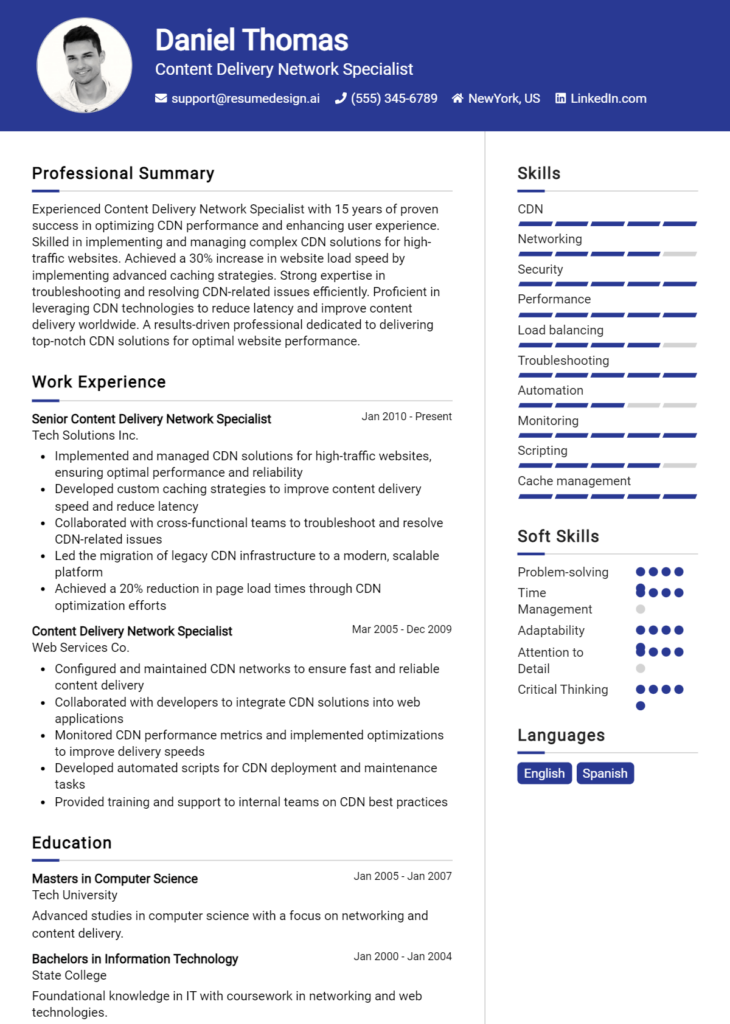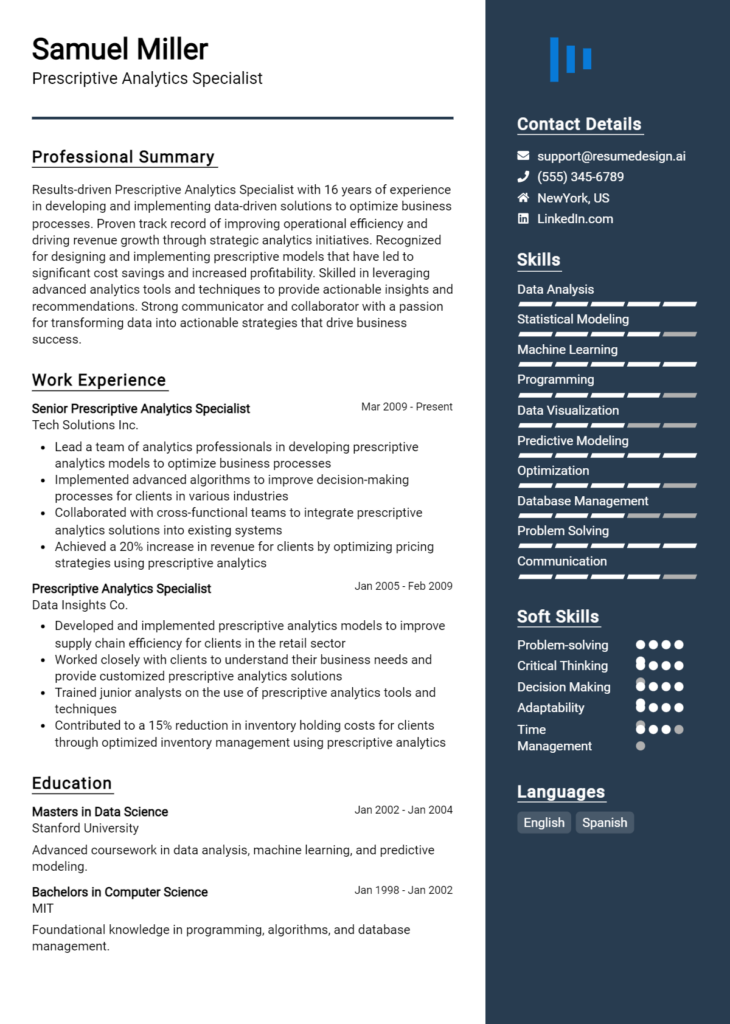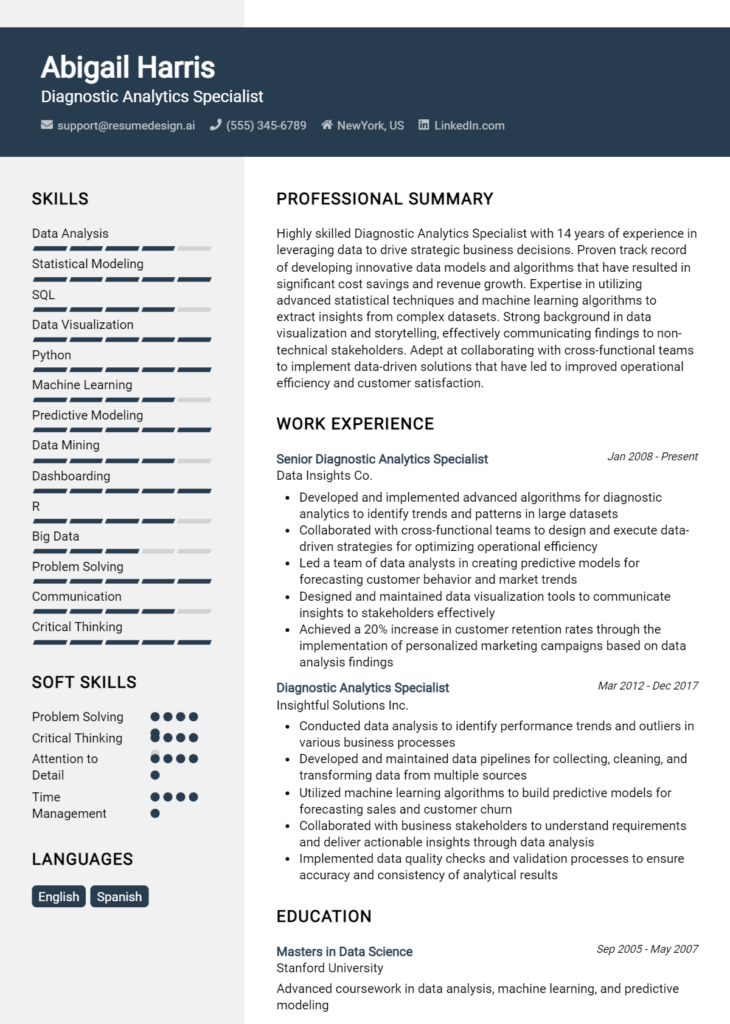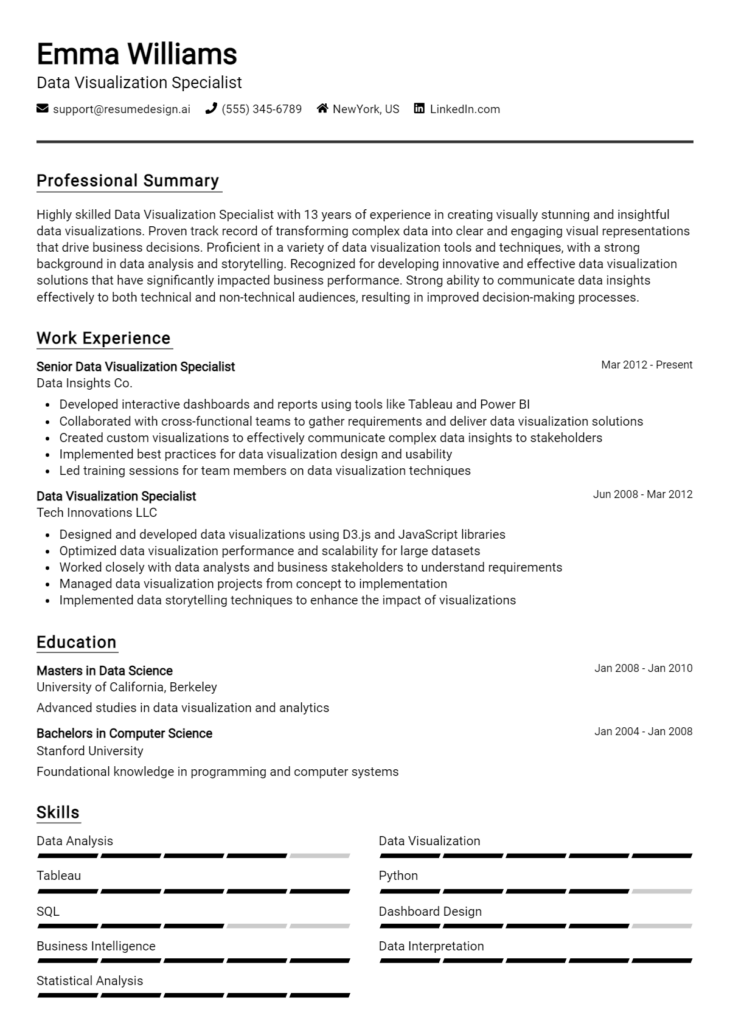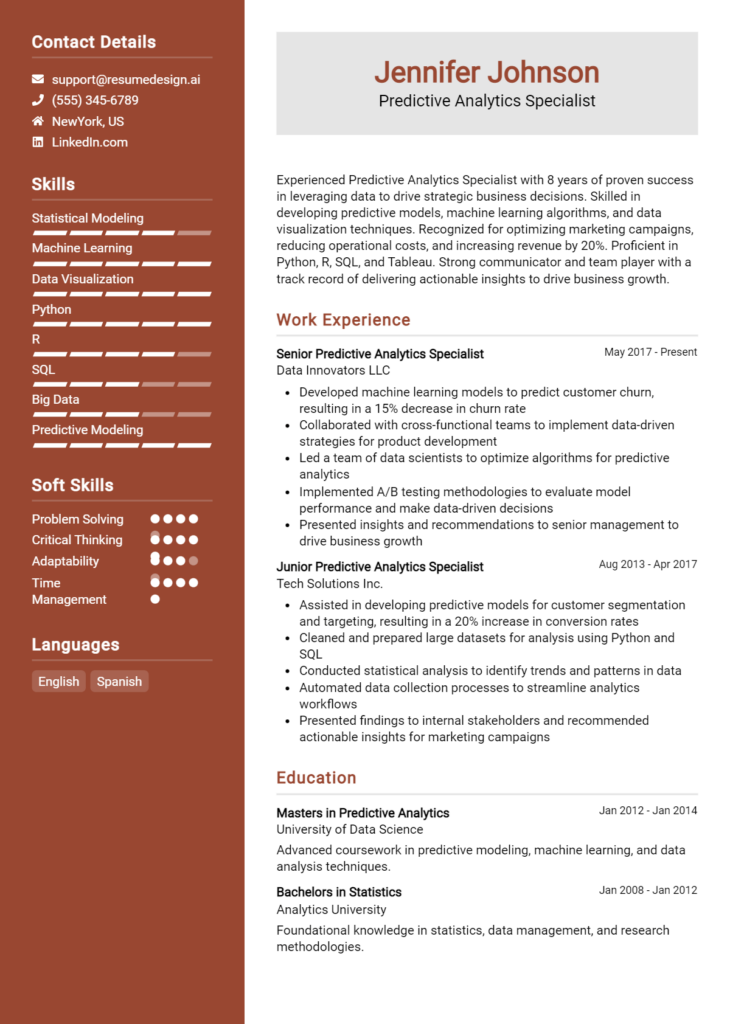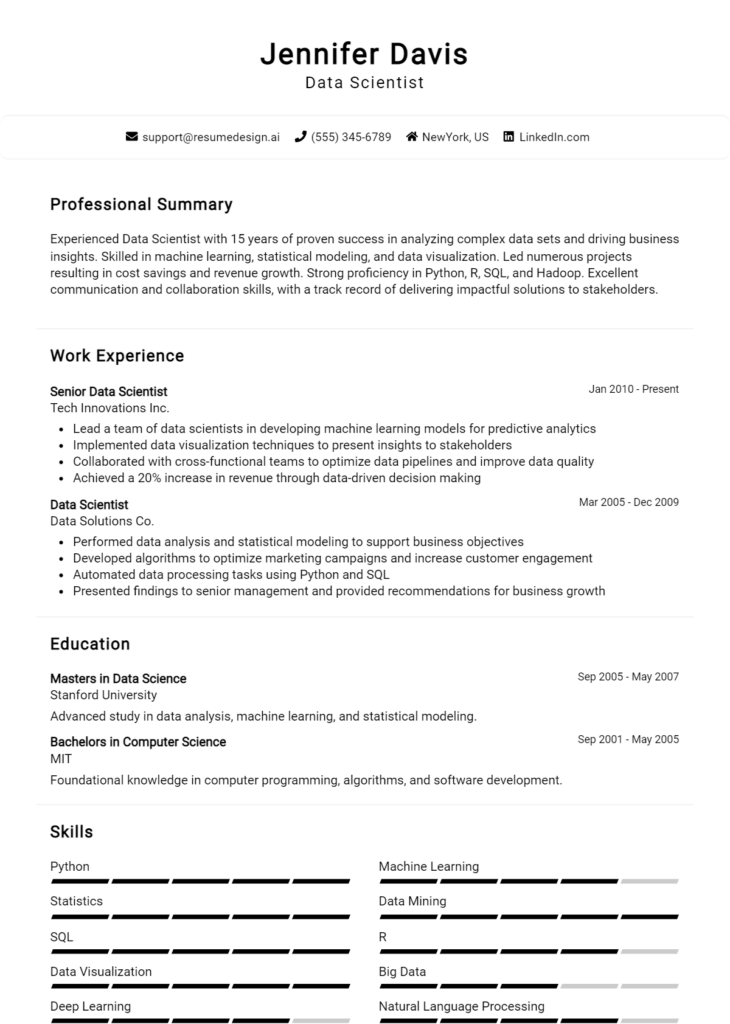Responsible AI Specialist Core Responsibilities
A Responsible AI Specialist plays a vital role in ensuring that artificial intelligence systems operate ethically and align with organizational values. This professional collaborates across departments, bridging technical, operational, and compliance teams to address AI-related challenges. Key skills include strong analytical problem-solving, knowledge of AI ethics, and the ability to communicate complex concepts effectively. These competencies are essential for advancing an organization's mission, and a well-structured resume can showcase these qualifications to potential employers, highlighting a candidate's expertise in responsible AI practices.
Common Responsibilities Listed on Responsible AI Specialist Resume
- Develop and implement AI ethics frameworks and guidelines.
- Conduct risk assessments to identify potential biases in AI models.
- Collaborate with data scientists to ensure ethical data usage.
- Monitor AI systems for compliance with legal and regulatory standards.
- Educate stakeholders on responsible AI practices and policies.
- Facilitate cross-departmental workshops on AI ethics.
- Analyze AI performance metrics to ensure fairness and accountability.
- Advise on the ethical implications of AI deployment strategies.
- Engage with external organizations to promote responsible AI initiatives.
- Stay updated on industry trends and advancements in AI ethics.
High-Level Resume Tips for Responsible AI Specialist Professionals
In today's rapidly evolving technological landscape, the role of a Responsible AI Specialist has never been more critical. As organizations strive to implement ethical and fair AI practices, your resume serves as the first impression you make on potential employers, setting the tone for your candidacy. A well-crafted resume not only showcases your relevant skills and achievements but also reflects your understanding of the complexities and responsibilities inherent in the field of artificial intelligence. This guide will provide practical and actionable resume tips specifically tailored for Responsible AI Specialist professionals, helping you stand out in a competitive job market.
Top Resume Tips for Responsible AI Specialist Professionals
- Tailor your resume to each job description by incorporating keywords and phrases that align with the specific requirements of the position.
- Highlight your relevant experience in AI ethics, fairness, and transparency, showcasing projects where you implemented responsible AI practices.
- Quantify your achievements by using metrics and data to demonstrate the impact of your work, such as "Reduced bias in AI models by 30% through rigorous testing."
- Include certifications and training related to responsible AI, ethics, and data governance to establish credibility in the field.
- Showcase your understanding of regulatory requirements and standards associated with AI, such as GDPR or IEEE guidelines.
- Emphasize collaboration skills by detailing experiences working with cross-functional teams to promote ethical AI initiatives.
- Utilize a clear and professional format that enhances readability while allowing your skills and achievements to shine.
- Incorporate a summary statement that outlines your passion for responsible AI and your commitment to ethical technology development.
- Leverage any public speaking experiences or contributions to industry discussions on responsible AI to position yourself as a thought leader.
Implementing these tips can significantly enhance your resume, increasing your chances of landing a job in the Responsible AI Specialist field. By clearly articulating your qualifications and demonstrating your commitment to ethical AI practices, you will be better positioned to attract the attention of hiring managers and make a lasting impression in this vital area of technology.
Why Resume Headlines & Titles are Important for Responsible AI Specialist
In the competitive field of Responsible AI, a well-crafted resume headline or title serves as a crucial first impression for candidates vying for the role of Responsible AI Specialist. A strong headline can immediately grab the attention of hiring managers, summarizing a candidate's key qualifications and unique value proposition in just a few impactful words. This concise, relevant statement not only highlights the candidate's expertise in responsible AI practices but also aligns with the specific requirements of the job being applied for, making it an essential component of an effective resume.
Best Practices for Crafting Resume Headlines for Responsible AI Specialist
- Keep it concise, ideally between 5 to 10 words.
- Ensure relevance to the specific job description.
- Highlight key skills or certifications in responsible AI.
- Use action-oriented language to convey impact.
- Incorporate industry-specific keywords to enhance visibility.
- Avoid jargon that may not be universally understood.
- Reflect your unique contribution to AI ethics and governance.
- Tailor your headline for each application to align with the company’s values.
Example Resume Headlines for Responsible AI Specialist
Strong Resume Headlines
"Ethical AI Advocate with 7+ Years in Data Governance"
“Experienced Responsible AI Specialist | Machine Learning & Ethics Expert”
“Transforming AI Development with Ethical Frameworks | 5+ Years Experience”
Weak Resume Headlines
“AI Specialist”
“Professional with Experience”
The strong headlines are effective because they are specific, impactful, and tailored to the Responsible AI Specialist role, clearly indicating the candidate's expertise and accomplishments. They use relevant keywords and highlight the candidate's unique contributions, making them stand out to hiring managers. In contrast, the weak headlines fail to impress due to their vagueness and lack of detail, leaving hiring managers with little understanding of the candidate's qualifications or relevance to the position.
Writing an Exceptional Responsible AI Specialist Resume Summary
A well-crafted resume summary is crucial for a Responsible AI Specialist, as it serves as the first impression for hiring managers who often sift through numerous applications quickly. An impactful summary succinctly highlights the candidate's key skills, relevant experience, and notable accomplishments in the field of responsible AI. It should be concise, engaging, and tailored specifically to the job being applied for, ensuring that it captures the attention of recruiters and sets the tone for the rest of the resume.
Best Practices for Writing a Responsible AI Specialist Resume Summary
- Quantify Achievements: Use numbers and metrics to showcase your impact and contributions in previous roles.
- Focus on Relevant Skills: Highlight specific skills that are directly applicable to responsible AI, such as ethical AI design, bias mitigation, and compliance with regulations.
- Tailor for the Job Description: Customize the summary to reflect the specific requirements and competencies outlined in the job posting.
- Be Concise: Aim for 3-5 sentences that convey your expertise without overwhelming details.
- Use Action Words: Start sentences with strong action verbs to demonstrate proactivity and impact.
- Include Key Technologies: Mention any relevant software, tools, or methodologies you are proficient in that relate to responsible AI.
- Showcase Soft Skills: Highlight interpersonal skills such as collaboration and communication, which are essential in multidisciplinary teams.
- Reflect Passion for AI Ethics: Convey your commitment to ethical AI practices and continuous learning in the field.
Example Responsible AI Specialist Resume Summaries
Strong Resume Summaries
Dynamic Responsible AI Specialist with over 5 years of experience in developing ethical AI frameworks that reduced bias in machine learning models by 30% and improved compliance with industry regulations. Proven track record of collaborating with cross-functional teams to implement AI governance policies, enhancing trust and transparency in AI systems.
Results-driven Responsible AI Specialist skilled in deploying cutting-edge AI solutions with a focus on ethical standards and risk management. Successfully led a project that identified and mitigated algorithmic bias, resulting in a 40% increase in user satisfaction and a 25% reduction in complaints related to AI decisions.
Passionate about ethical AI, I bring a proven ability to design and implement responsible AI strategies. My efforts in integrating fairness and accountability have led to a 50% decrease in bias-related incidents in deployed models across diverse applications.
Weak Resume Summaries
Experienced AI professional with a focus on responsible practices and various technologies.
Responsible AI Specialist with knowledge in ethical AI and some experience in the field.
The strong resume summaries are effective because they provide specific metrics and achievements that demonstrate the candidate's impact in previous roles, making them stand out to hiring managers. They articulate relevant skills and experiences that are directly applicable to the position, showcasing a clear understanding of the responsibilities associated with the role. In contrast, the weak summaries lack detail and measurable outcomes, making them overly generic and less compelling to potential employers. They do not differentiate the candidate or provide insight into their specific qualifications or contributions in the field of responsible AI.
Work Experience Section for Responsible AI Specialist Resume
The work experience section of a Responsible AI Specialist resume is crucial as it serves as a platform for candidates to demonstrate their technical skills, leadership abilities, and capacity to deliver high-quality AI products. This section allows hiring managers to assess not only the candidate's direct experiences with AI technologies but also their proficiency in managing teams and projects. By quantifying achievements and aligning past experiences with industry standards, candidates can effectively showcase their value and fit for the role, making a compelling case for their candidacy.
Best Practices for Responsible AI Specialist Work Experience
- Highlight specific technical skills related to AI, such as machine learning algorithms, data ethics, and model evaluation.
- Quantify results using metrics to demonstrate the impact of your work, such as percentage improvements or project timelines.
- Showcase your ability to lead teams through complex projects that require collaboration across disciplines.
- Align your experiences with industry standards and best practices in responsible AI development.
- Include relevant certifications or training that enhance your qualifications in responsible AI.
- Utilize action verbs to convey a sense of proactivity and contribution in your role.
- Incorporate examples of how you addressed ethical considerations in AI projects.
- Highlight cross-functional collaboration with stakeholders to ensure that AI solutions meet diverse needs and regulations.
Example Work Experiences for Responsible AI Specialist
Strong Experiences
- Led a team of 10 in developing a machine learning model that improved predictive accuracy by 25%, resulting in a significant increase in client satisfaction.
- Implemented ethical AI guidelines that reduced biased outcomes in data processing, improving compliance with industry standards by 40%.
- Collaborated with cross-functional teams to deliver a responsible AI product ahead of schedule, decreasing time-to-market by 30%.
- Managed a project that integrated transparency features into AI systems, enhancing user trust and reducing support queries by 50%.
Weak Experiences
- Worked on AI projects that involved various tasks.
- Participated in team meetings about AI strategies.
- Assisted in the development of machine learning algorithms.
- Involved in discussions about ethical AI considerations.
The strong experiences are considered impactful because they provide concrete, quantifiable results that illustrate the candidate's effectiveness and technical leadership. They highlight specific achievements and demonstrate a clear understanding of responsible AI practices. In contrast, the weak experiences lack detail and specificity, failing to convey the candidate's contributions or the significance of their roles in previous positions. This lack of clarity and quantification can leave hiring managers unconvinced of the candidate's capabilities.
Education and Certifications Section for Responsible AI Specialist Resume
The education and certifications section of a Responsible AI Specialist resume plays a critical role in establishing the candidate's qualifications and expertise in a rapidly evolving field. This section not only highlights the candidate's academic background but also showcases their commitment to continuous learning through industry-relevant certifications and specialized training. By providing pertinent coursework, recognized certifications, and advanced training, candidates can significantly enhance their credibility and demonstrate alignment with the expectations of the job role, ultimately making them more competitive in the job market.
Best Practices for Responsible AI Specialist Education and Certifications
- Focus on relevant degrees such as Computer Science, Data Science, Artificial Intelligence, or Ethics in Technology.
- Include industry-recognized certifications from organizations like the IEEE, Data Science Council of America, or professional AI associations.
- Detail specific coursework that pertains to AI ethics, machine learning, data privacy, and algorithmic bias.
- Highlight advanced degrees (Master’s or PhD) that demonstrate a deeper understanding of AI principles and technologies.
- Showcase ongoing education efforts, such as online courses or workshops, to reflect a commitment to staying current in the field.
- List any specialized training programs that focus on responsible AI practices and compliance with legal and ethical standards.
- Use clear formatting and concise language to make the information easily accessible to hiring managers.
- Prioritize certifications that emphasize ethical AI practices, data handling, and algorithmic transparency.
Example Education and Certifications for Responsible AI Specialist
Strong Examples
- Master of Science in Artificial Intelligence, Stanford University
- Certified Ethical Emerging Technologist (CEET), IEEE
- Coursework in AI Ethics and Governance, Massachusetts Institute of Technology
- Professional Certificate in Machine Learning and AI, edX
Weak Examples
- Bachelor of Arts in History
- Certification in Basic Computer Skills
- Outdated certifications in early programming languages no longer in use
- Unrelated coursework in general business management
The strong examples are considered effective because they directly relate to the responsibilities and challenges faced by a Responsible AI Specialist, demonstrating both advanced knowledge and a commitment to ethical practices in AI. In contrast, the weak examples fail to align with the job requirements, showcasing irrelevant educational backgrounds or outdated credentials that do not contribute to the candidate’s qualifications in the responsible AI landscape.
Top Skills & Keywords for Responsible AI Specialist Resume
In the rapidly evolving field of artificial intelligence, the role of a Responsible AI Specialist has become increasingly vital. This specialist is tasked with ensuring that AI systems are developed and deployed ethically, transparently, and in alignment with societal values. A well-crafted resume that highlights the right skills can significantly enhance a candidate's prospects in this competitive landscape. Both hard and soft skills are essential; while hard skills demonstrate technical proficiency and knowledge, soft skills reflect a candidate's ability to collaborate, communicate, and navigate complex ethical considerations. By showcasing a balanced mix of these skills, candidates can present themselves as well-rounded professionals ready to tackle the challenges of responsible AI.
Top Hard & Soft Skills for Responsible AI Specialist
Soft Skills
- Ethical Decision-Making
- Critical Thinking
- Communication Skills
- Team Collaboration
- Problem-Solving
- Adaptability
- Empathy
- Stakeholder Engagement
- Conflict Resolution
- Cultural Awareness
- Leadership
- Active Listening
- Negotiation Skills
- Creativity
- Emotional Intelligence
Hard Skills
- Knowledge of AI and Machine Learning Algorithms
- Data Analysis and Interpretation
- Programming Languages (Python, R, etc.)
- Familiarity with AI Frameworks (TensorFlow, PyTorch)
- Understanding of Data Privacy Regulations (GDPR, CCPA)
- Risk Management in AI Systems
- Model Evaluation and Bias Assessment
- Experience with Ethical AI Frameworks
- Technical Writing and Documentation
- Familiarity with Cloud Computing Platforms (AWS, Azure)
- Knowledge of Statistical Methods
- Experience with AI Governance Policies
- Proficiency in Software Development Lifecycle (SDLC)
- Cybersecurity Awareness
- Familiarity with Human-Centered Design Principles
By strategically incorporating these skills into your resume, alongside a focus on relevant work experience, you can effectively position yourself as a top candidate for the role of Responsible AI Specialist.
Stand Out with a Winning Responsible AI Specialist Cover Letter
Dear Hiring Manager,
I am writing to express my interest in the Responsible AI Specialist position at [Company Name]. With a solid background in artificial intelligence and a passion for ensuring ethical practices in technology, I am excited about the opportunity to contribute to your team. My experience in developing guidelines for AI implementation, combined with my commitment to promoting fairness, transparency, and accountability in AI systems, aligns perfectly with your organization's mission to harness AI for good.
In my previous role at [Previous Company], I successfully led initiatives focused on integrating ethical considerations into AI project lifecycles. I collaborated with cross-functional teams to create a framework that assessed the impact of AI algorithms on diverse communities, ensuring that our solutions were not only innovative but also equitable. This experience honed my ability to communicate complex technical concepts to diverse stakeholders, enabling informed decision-making that prioritizes responsible AI practices. Additionally, my expertise in compliance and risk management helped mitigate potential biases, ultimately enhancing user trust and satisfaction.
I am particularly drawn to [Company Name] because of your commitment to developing AI technologies that prioritize ethical standards. I admire your recent projects, such as [specific project or initiative], which exemplify a proactive approach to responsible AI. I am eager to bring my skills in ethical AI assessment and stakeholder engagement to your team, ensuring that your AI initiatives align with societal values and regulatory requirements.
Thank you for considering my application. I look forward to the opportunity to discuss how my background and passion for responsible AI can contribute to the innovative work at [Company Name]. I am excited about the possibility of joining your team and helping shape the future of AI technology in a way that benefits all.
Sincerely,
[Your Name]
[Your Contact Information]
Common Mistakes to Avoid in a Responsible AI Specialist Resume
When crafting a resume for a Responsible AI Specialist role, it's crucial to highlight your expertise and commitment to ethical AI practices. However, many candidates fall into common pitfalls that can undermine their chances of landing an interview. Avoiding these mistakes can significantly enhance your resume's effectiveness and demonstrate your suitability for the role. Here are some common mistakes to watch out for:
Vague Job Descriptions: Using generic terms without specific examples can make your experience seem less impactful. Clearly articulate your roles and achievements in previous positions.
Neglecting Soft Skills: Focusing solely on technical skills can overlook the importance of soft skills like communication and teamwork, which are vital in responsible AI practices.
Omitting Relevant Certifications: Failing to list certifications related to AI ethics, data privacy, or algorithmic fairness can be a missed opportunity to showcase your commitment to responsible AI.
Ignoring Industry Trends: Not mentioning familiarity with current ethical AI frameworks or guidelines can make your resume seem outdated. Stay informed and reference relevant frameworks.
Overloading with Jargon: Using excessive technical jargon without context can alienate readers. Ensure your resume is accessible to both technical and non-technical stakeholders.
Lack of Quantifiable Achievements: Failing to include measurable outcomes or specific results from your work can weaken your impact. Use data to illustrate your contributions whenever possible.
Formatting Issues: Poor layout and inconsistent formatting can make your resume hard to read. Aim for a clean, professional look that enhances the clarity of your information.
Not Tailoring for the Role: Sending out a generic resume instead of customizing it for the specific Responsible AI Specialist position can signal a lack of genuine interest in the role. Tailor your resume to reflect the job description and required skills.
Conclusion
As we delve into the vital role of a Responsible AI Specialist, it's clear that the responsibilities extend beyond technical expertise to include ethical considerations, regulatory compliance, and stakeholder engagement. The growing importance of responsible AI practices underscores the need for professionals who can navigate the complexities of AI systems while ensuring they are designed and deployed in a manner that is ethical and transparent.
Key points covered in the article include:
- Understanding Responsible AI: Emphasizing the importance of ethical frameworks and guidelines that govern AI development and deployment.
- Technical Proficiency: Highlighting the need for a strong foundation in AI technologies, including machine learning, natural language processing, and data analytics.
- Regulatory Awareness: Discussing the significance of staying updated on evolving regulations and standards related to AI ethics and compliance.
- Stakeholder Engagement: Stressing the necessity of collaborating with diverse teams, including data scientists, ethicists, and legal experts, to foster a holistic approach to responsible AI practices.
In conclusion, if you are seeking to enhance your career as a Responsible AI Specialist, it's crucial to ensure your resume reflects your skills, experiences, and commitment to ethical AI practices. Take the time to review your resume and make any necessary updates.
To assist you in this process, consider utilizing available resources such as resume templates, a resume builder, resume examples, and cover letter templates. These tools can help you create a standout application that highlights your qualifications and dedication to responsible AI. Don’t wait—take the next step in your career today!

